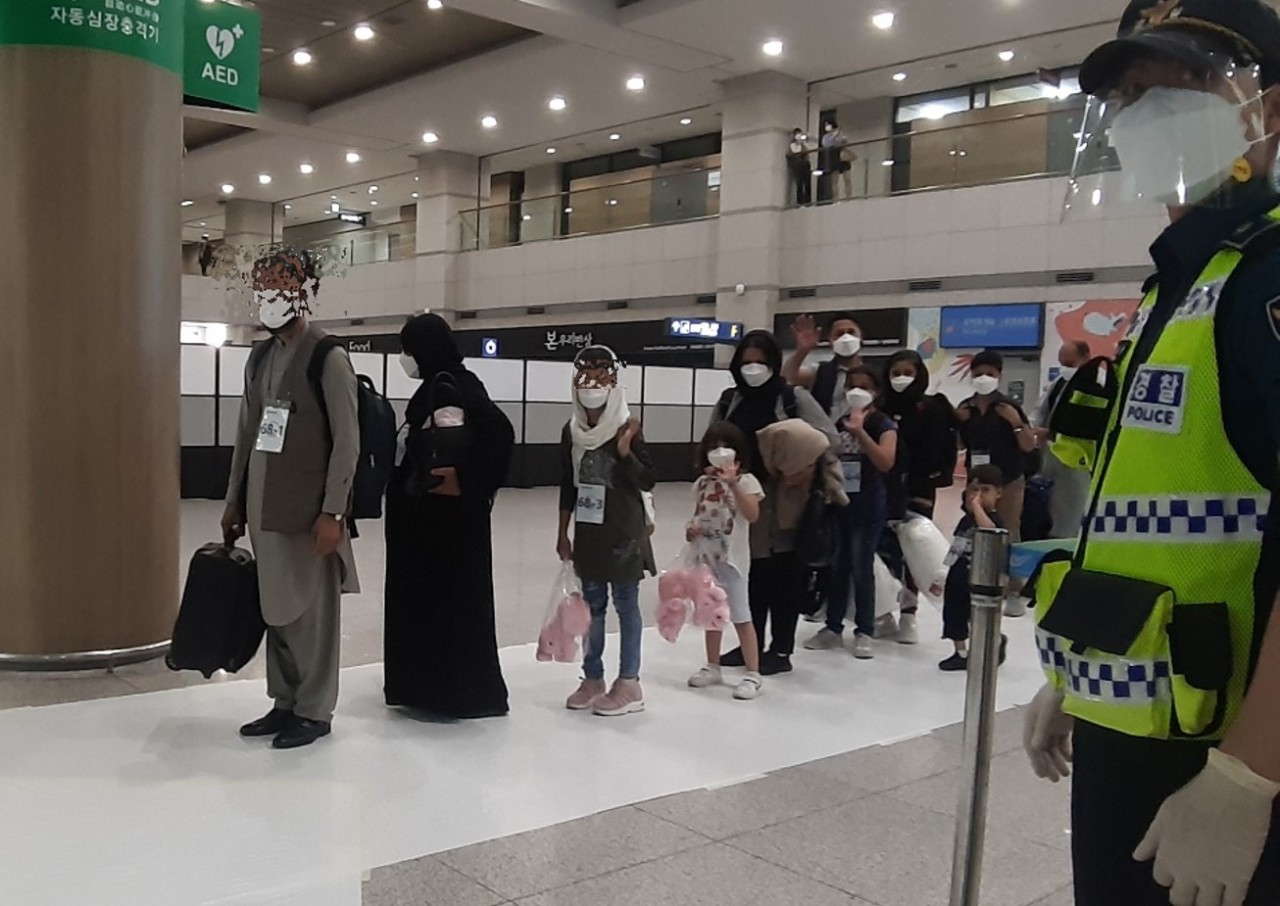[Herald Interview] I feel totally safe now: Afghan helper
Evacuee says many were left behind, Taliban hunting collaborators
By Shin Ji-hyePublished : Aug. 30, 2021 - 11:41

An Afghan national evacuated to South Korea five days ago has told the Korea Herald that he feels “totally safe” after arriving here.
“Outside the facility where I stay now, I see a flag in my language Farsi that ‘Don’t be disappointed. Korea supports you.’ When I see these kinds of flags, these kinds of messages from Korean people, I don’t know how to thank them,” he said by phone from his accommodation at a government facility in Jincheon, North Chungcheong Province.
The man, who asked to be anonymous for safety reasons, was among 391 people the South Korean government flew out of Afghanistan over fears of Taliban retaliation for having worked in South Korean projects in his country.
Until last week, he was staying near the airport in Kabul.
After the withdrawal of US troops, he left home and headed there, changing his exact location regularly.
“Taliban is seeking former Afghan government employees, local staff who worked with international NGOs and embassies. I was trying to be completely low profile.”
He received many anonymous telephone threats even before the US troops left.
“Some of them asked me some specific things and to bring some documents. I couldn’t recognize who they are.”
What scared him and other Afghans the most was the uncertainty.
“Under the normal government, if someone takes you (to the) police, everyone knows you will be detained, you will go to the court and after trial you will go to prison or be released.”
“But with Taliban, no one knows what will happen. Maybe they try to torture you to get some information. Maybe they will kill you. No one knows. This kind of ambiguity kills people.”
About the evacuation process, he declined to say much because it remains “very sensitive” and could affect the ongoing evacuations of other people.
One thing he could say, “Without cooperation -- I don’t know whether the word, ‘cooperation,’ is proper -- with Taliban, no one is able to evacuate.”
Some Korean media outlets have reported that there are more Afghans who were involved in Korean companies or organizations. Civic groups have called on the government to save more Afghans.
He said the relocation and evacuation of Afghans to Korea happened very suddenly, as the Korean government was not sufficiently prepared to recognize and identify the people who have helped them.
“They don’t have resources to identify. And this is the same thing to American and European countries too. Everything was so sudden.”
Although he feels safe here, he is saddened by thoughts of those left behind.
“When I recall the faces of people and the situation in Afghanistan, I become very emotional. I cannot stop crying.”
When The Korea Herald first contacted him six days ago, hours before the flight departed from Kabul, he was still hesitant to leave. He said he felt sad to leave everything behind -- his country and the people.
“I decided to leave my country. I want to help and support my people either morally or financially. You need to be safe at least. You cannot help them if you are in the same disaster.
“I was losing hope when I saw the insecurity, instability and intimidation. But I tried to be strong as much as I can.”
When asked whether his friends wanted to come to Korea with him, he said that the destination did not matter to them.
“They want to be in a safe place. For them, it doesn’t matter whether they live in a mountain or sea. They want to escape from Taliban. They don’t want to die for nothing.”
He is safe from the violence in Afghanistan now. But he and about 400 other Afghans -- many of whom are children -- face an uncertain future here.
The Korean government issued a short-term visit (C-3) entry visa to the people on Thursday upon their arrival. After the C-3 visas expire, the Ministry of Justice plans to issue a visa status that would permit work in Korea (F-2) so the Afghan citizens can become independent and self-reliant.
But Korea, a highly homogenous nation, has little in common culturally, religiously and socially with Afghanistan.
“Everything is uncertain. The only thing I now know is that I am here in Korea. I don’t know what will happen in the next week.
“You know, the 400 people. Some don’t know the (Korean) language. Some don’t know English. It’s a big question for me how to integrate in the Korean society.”











![[Today’s K-pop] BTS pop-up event to come to Seoul](http://res.heraldm.com/phpwas/restmb_idxmake.php?idx=644&simg=/content/image/2024/04/17/20240417050734_0.jpg&u=)





![[KH Explains] Hyundai's full hybrid edge to pay off amid slow transition to pure EVs](http://res.heraldm.com/phpwas/restmb_idxmake.php?idx=652&simg=/content/image/2024/04/18/20240418050645_0.jpg&u=20240418181020)

![[Today’s K-pop] Zico drops snippet of collaboration with Jennie](http://res.heraldm.com/phpwas/restmb_idxmake.php?idx=642&simg=/content/image/2024/04/18/20240418050702_0.jpg&u=)